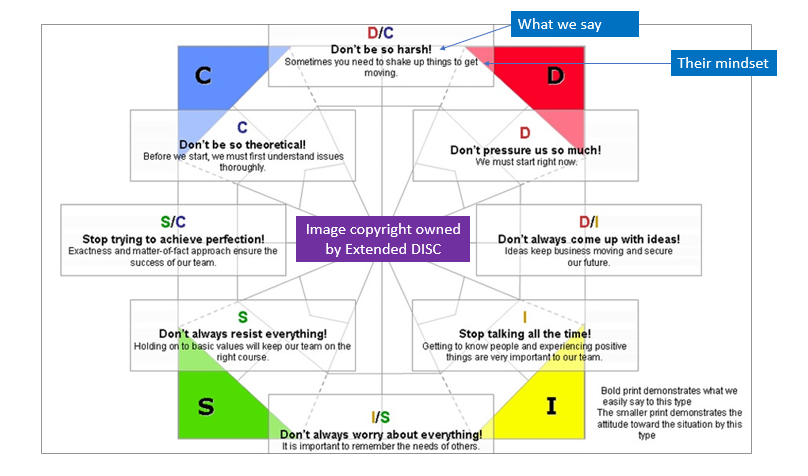Conflict Management and Resolution
One major factor that is often missed in traditional conflict resolution training is the impact of behavioural styles in conflict management.
DISCerning Communication Manages Conflict
Conflict is inevitable. Whenever there is an unmet need conflict arises. However, some conflicts can be anticipated and prevented.
Now, some conflicts are hidden or suppressed while others actually produce positive results.
But what about those frustrating, energy sapping conflicts?
Is there a way that we can prevent those?
There is a lot of work put into the issue of Conflict Resolution. However, what can be done to prevent conflicts versus resolving them?
That is the focus of this approach with the support of the Extended DISC® Conflict DNA behavioural assessments.
Miscommunication
A lot of conflicts arise from miscommunication.
The problem often starts with the sender. This can occur because what is sent does not fully and accurately represent what the sender has in mind.
Sender distortion is caused by many factors. One of the most prevalent ones is “engaging mouth before brain”. Others include state of mind, haste and other distractions.
Sender distortion may also be impacted by their preference for the words used, expressions, the tone and their body language.
The message may not be received and interpreted as intended for similar reasons.
The receiver’s behavioural style and mood may cause them to read into the message things that were not intended. A hasty reading might result in their missing key points. Also, their knowledge and relationship with the sender might cloud how they receive the message. Add bias, assumptions, education, culture, past experience etc.
These sender and receiver distortion factors are important in discussing the impact of communication in conflict resolution and management.

Behavioural Styles And Conflict Management
Our behavioural style is how we choose to navigate through life and relate to others. It is displayed in our actions … the way we are. Our preferred style is a variation or combination of four primary approaches or mind sets – Dominance, Inducement, Steadiness and Conscientiousness (D-I-S-C).
Behavioural style conflicts – hidden, suppressed and openly displayed – account for an unbelievably high percentage of inter-personal challenges. Communicating in your preferred behavioural language may result in inappropriately designed messages which are further distorted by a receiver using another behavioural style.
Communication is impeded and conflicts arise when the parties in the conversation speak different behavioural languages. Learning and using D-I-S-C – the universal language of behaviors – is a powerful way to manage and prevent conflict.
Mutually satisfying results are achieved by modifying communication styles.
That is one direct benefit of having teams go through our High Performance Team Boost Initiative.
Team members learn about their personal behavioural style and how to respond appropriately to the behavioural preferences of their colleagues. This dramatically reduces conflict and facilitates swift resolution of conflicts that arise.

Extended DISC® Power User Certification
Power User Certification training equips you with Conflict Management skills that can be shared with team leaders across the organization.
Remove roadblocks to team performance including unproductive conflict, low engagement, disconnected communication, social awkwardness, disjointed interpersonal dynamics, inappropriate behaviour, high staff turnover, role misalignment, “difficult people” challenges, absence of shared values and toxic culture.
Tap into diverse work styles, underutilized potential and creativity to boost productivity.
Connect and communicate better behaviourally.
Experience new, productive attitudes and behaviours that are aligned to vision, values and context.
Drive revenue growth and profitability.
Get certified and add even more value!
Deploy Extended DISC® Conflict Resolution Assessments!
Open a new dimension in conflict management by recognizing the important behavioural factor. Prevent and resolve disputes, while facilitating team cohesiveness and increased productivity.
Workplace disputes and DISCerning Communication
Developing a culture of applying DISCerning Communication works wonders in quickly resolving disputes.
DISCerning Communication is an extension of the DISC Model into effective ways of relating to others – speaking the language of behaviours.
Let us review an I-Style case
Team members who have a preference for the I-style are often simultaneously the source of great pleasure and immense frustration.
Reliability is the major issue for others. “But you said you would……” is a recurring phrase.
Here is a radically different perspective that might save you from pulling out more hair.
Our DISCerning Communication skills inform us that a feature of the I-Style is the desire to please. They seek success with and through people.
Given the need to please others, there is a tendency to say “Yes” readily. There is also their need for interaction.
Let’s use Ivan as an example. You ask him to do you a favor and he says “Sure.” What are Ivan’s realities?
He has a full time job, is President of his Citizens Association, Vice President with responsibilities for Member Issues at his Service Club, enrolled in evening classes…….. Honestly, where would Ivan find the time to carry out your favor?
The bottom line is that people using the I-Style have a tendency to over-commit. Their desire to please and to connect makes them want to serve.
We poke fun at Ivan by noting that when he says “Consider it done”, he instantly considers it as having been done.
How does DISCerning Communication help dealing with Ivan?
- Take care to have Ivan clarify if his response is Yes (meaning I would like to help) or a genuine commitment to completing your task.
- Discuss implementation so that the issue is moved from the surface.
- Establish deadlines.
- Put reminders in place.
- Monitor progress.
DISCerning Communication makes a difference.
Build your DISCerning Communication culture on the platform of Extended DISC® Behavioural DNA assessments for individuals and teams.

Extended DISC® Behavioural DNA assessments in Conflict Management
- Understand self and your preferences and how to communicate with others in their preferred behavioural language.
- Deflect things that would normally upset you because you understand the behavioural style of the other party.
- Communicate in a behavioural language that gets your message across effectively.
- Give and receive instructions and feedback using DISCerning Communication to have them land just the way you envisaged.
- Use Extended DISC® team reports to achieve breakthrough understandings and high levels of unity and team spirit.
- Use DISCerning Communication principles to avoid hot buttons. Inform your choice of words and learn to navigate tricky conversations.
Extended DISC® Power User Certification equips you to guide impactful interventions. Get certified!
